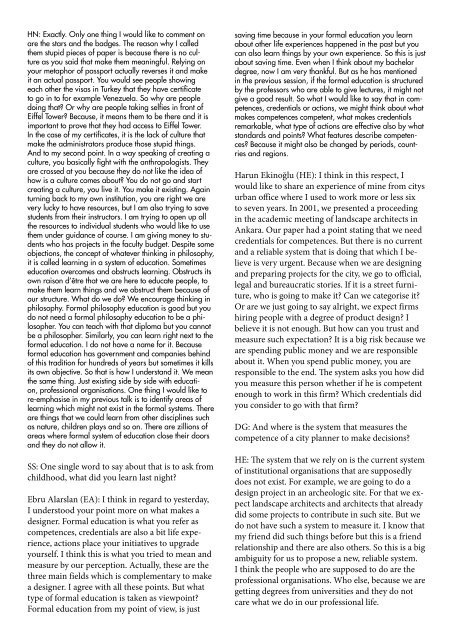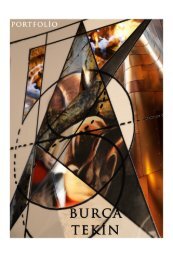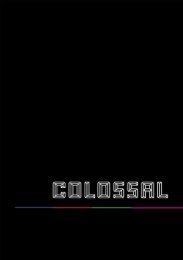BURCA TEKİN - 11535024 -
You also want an ePaper? Increase the reach of your titles
YUMPU automatically turns print PDFs into web optimized ePapers that Google loves.
HN: Exactly. Only one thing I would like to comment on<br />
are the stars and the badges. The reason why I called<br />
them stupid pieces of paper is because there is no culture<br />
as you said that make them meaningful. Relying on<br />
your metaphor of passport actually reverses it and make<br />
it an actual passport. You would see people showing<br />
each other the visas in Turkey that they have certificate<br />
to go in to for example Venezuela. So why are people<br />
doing that? Or why are people taking selfies in front of<br />
Eiffel Tower? Because, it means them to be there and it is<br />
important to prove that they had access to Eiffel Tower.<br />
In the case of my certificates, it is the lack of culture that<br />
make the administrators produce those stupid things.<br />
And to my second point. In a way speaking of creating a<br />
culture, you basically fight with the anthropologists. They<br />
are crossed at you because they do not like the idea of<br />
how is a culture comes about? You do not go and start<br />
creating a culture, you live it. You make it existing. Again<br />
turning back to my own institution, you are right we are<br />
very lucky to have resources, but I am also trying to save<br />
students from their instructors. I am trying to open up all<br />
the resources to individual students who would like to use<br />
them under guidance of course. I am giving money to students<br />
who has projects in the faculty budget. Despite some<br />
objections, the concept of whatever thinking in philosophy,<br />
it is called learning in a system of education. Sometimes<br />
education overcomes and obstructs learning. Obstructs its<br />
own raison d’être that we are here to educate people, to<br />
make them learn things and we obstruct them because of<br />
our structure. What do we do? We encourage thinking in<br />
philosophy. Formal philosophy education is good but you<br />
do not need a formal philosophy education to be a philosopher.<br />
You can teach with that diploma but you cannot<br />
be a philosopher. Similarly, you can learn right next to the<br />
formal education. I do not have a name for it. Because<br />
formal education has government and companies behind<br />
of this tradition for hundreds of years but sometimes it kills<br />
its own objective. So that is how I understand it. We mean<br />
the same thing. Just existing side by side with education,<br />
professional organisations. One thing I would like to<br />
re-emphasise in my previous talk is to identify areas of<br />
learning which might not exist in the formal systems. There<br />
are things that we could learn from other disciplines such<br />
as nature, children plays and so on. There are zillions of<br />
areas where formal system of education close their doors<br />
and they do not allow it.<br />
SS: One single word to say about that is to ask from<br />
childhood, what did you learn last night?<br />
Ebru Alarslan (EA): I think in regard to yesterday,<br />
I understood your point more on what makes a<br />
designer. Formal education is what you refer as<br />
competences, credentials are also a bit life experience,<br />
actions place your initiatives to upgrade<br />
yourself. I think this is what you tried to mean and<br />
measure by our perception. Actually, these are the<br />
three main fields which is complementary to make<br />
a designer. I agree with all these points. But what<br />
type of formal education is taken as viewpoint?<br />
Formal education from my point of view, is just<br />
saving time because in your formal education you learn<br />
about other life experiences happened in the past but you<br />
can also learn things by your own experience. So this is just<br />
about saving time. Even when I think about my bachelor<br />
degree, now I am very thankful. But as he has mentioned<br />
in the previous session, if the formal education is structured<br />
by the professors who are able to give lectures, it might not<br />
give a good result. So what I would like to say that in competences,<br />
credentials or actions, we might think about what<br />
makes competences competent, what makes credentials<br />
remarkable, what type of actions are effective also by what<br />
standards and points? What features describe competences?<br />
Because it might also be changed by periods, countries<br />
and regions.<br />
Harun Ekinoğlu (HE): I think in this respect, I<br />
would like to share an experience of mine from citys<br />
urban office where I used to work more or less six<br />
to seven years. In 2001, we presented a proceeding<br />
in the academic meeting of landscape architects in<br />
Ankara. Our paper had a point stating that we need<br />
credentials for competences. But there is no current<br />
and a reliable system that is doing that which I believe<br />
is very urgent. Because when we are designing<br />
and preparing projects for the city, we go to official,<br />
legal and bureaucratic stories. If it is a street furniture,<br />
who is going to make it? Can we categorise it?<br />
Or are we just going to say alright, we expect firms<br />
hiring people with a degree of product design? I<br />
believe it is not enough. But how can you trust and<br />
measure such expectation? It is a big risk because we<br />
are spending public money and we are responsible<br />
about it. When you spend public money, you are<br />
responsible to the end. The system asks you how did<br />
you measure this person whether if he is competent<br />
enough to work in this firm? Which credentials did<br />
you consider to go with that firm?<br />
DG: And where is the system that measures the<br />
competence of a city planner to make decisions?<br />
HE: The system that we rely on is the current system<br />
of institutional organisations that are supposedly<br />
does not exist. For example, we are going to do a<br />
design project in an archeologic site. For that we expect<br />
landscape architects and architects that already<br />
did some projects to contribute in such site. But we<br />
do not have such a system to measure it. I know that<br />
my friend did such things before but this is a friend<br />
relationship and there are also others. So this is a big<br />
ambiguity for us to propose a new, reliable system.<br />
I think the people who are supposed to do are the<br />
professional organisations. Who else, because we are<br />
getting degrees from universities and they do not<br />
care what we do in our professional life.<br />
HN: So how did you measure their previous work? Because<br />
that their work is out there. If they screwed a job before, you<br />
simply fire them.<br />
HE: But how could we? It is still not objective. It is about how<br />
they present it to you.<br />
DG: You asked a question but the answer is not black and<br />
white. When you are building a bridge, an engineer has to<br />
have a license and hopefully the engineer who passes can<br />
build a bridge. It is not always true. Architects I know in Turkey<br />
have to be part of a professional organisation in order to sign<br />
a document. But looking around, some buildings are not so<br />
much of a presence to the people. Doctors also have to pass<br />
through a license and hopefully most of the doctors are ok.<br />
But sometimes they are not. So, when it comes to design, it is<br />
much less structured than medicine, engineering or law. But<br />
you are expecting a professional organisation to say that this<br />
designer or colleague is good and this designer or colleague<br />
is not good.<br />
HE: It is not that much of good or not good analogy. He did<br />
this, in this year, in this budget, in this area. So everything<br />
becomes very objective.<br />
DG: Life is not objective, it is rather difficult. The answer to<br />
your question is if, because the public money is concerned<br />
which is a problem, since you need some support to make a<br />
decision, I think it comes to a big project that in making the<br />
decision, and choosing between some options. If you include<br />
according to the criteria to a committee that is making decisions,<br />
with several representatives of a professional organisation,<br />
they probably have the experience to see who the candidates<br />
are and suggest that this one might be a better chance<br />
than this one.<br />
HE: I wish we could have such a committee or a routine processes.<br />
But actually we have such committees in competitions.<br />
For example, there was an amazing committee for the competition<br />
we did in Yenikapı area. It was with architects that are in<br />
well reputation. They did a critical and in-depth evaluation but<br />
in the routine, there is no such committee.<br />
DG: Life is difficult.<br />
SS: Coming back to what we were talking, what do you mean<br />
by there must be an evaluation added to these three. We have<br />
credentials, competences and actions but we do not have<br />
evaluation. Should we add this one?<br />
DG: I think it is a good question. For example, there are<br />
designers in Ontario the providence of Canada. The graphic<br />
designers miraculously succeeded in moving through the parliament.<br />
A resolution which registered graphic designers. It is<br />
not good for everywhere but in Ontario if you want to say that<br />
you are a graphic designer, you have to pass an examination<br />
and the approval of a professional organisation. Now once<br />
they did that and since you have to be a part of a professional<br />
organisation, it gives them cloud and power. So what they<br />
have in theory is that in three to five years, they can say lets<br />
see if you are still competent. Did you take a course? Did you<br />
do this and that? Yes, and than we approve you once again,<br />
you have our confirmation.<br />
Now that is part of lifetime learning. And they force you<br />
to learn. That might be good for Ontario, so what you<br />
say is I think a part of culture of lifetime learning. I think<br />
it is everything.<br />
SS: I think it is more of an ingredient at this point before<br />
the culture is built. If from today we ask our children<br />
what did you learn last evening every morning, they realise<br />
that they learn something on a daily basis. By the<br />
time they are forty, it becomes natural. Then we need<br />
this evaluation. But at this point maybe we need it until<br />
forty years from now. When we do not need it anymore<br />
we can get rid of it.<br />
AS: I think we were talking about systems and formalisations<br />
at the same time you brought up the term called<br />
currency as a metaphor for how to handle credits.<br />
We all know how that works with likes or dislikes on<br />
Facebook and such. I would like to ask Cihan because I<br />
think that our discussions are based on a very orthodox<br />
education as well as credits and actions. With your<br />
profile could you explain where did you come from and<br />
how did you spent one year without electricity? You do<br />
something very different and might have some ideas<br />
on how things could be very very differently. What is a<br />
competence for you? How do you recognise it, yourself<br />
along with the abilities you have on each other? I think<br />
you have a lot to say so I ask you to give a short review<br />
of yesterday.<br />
Cihan Çankaya (CÇ): In our case, we have more practical<br />
things. The most important thing for us first, is to<br />
see past works. This is the most important part actually<br />
but sometimes in cases like these, we fail as these works<br />
can be bad but presented good. When we first started<br />
with Decol, we had trusted to our showreels on evaluating<br />
how we did and called in the past. We give credits<br />
to showreels. But then we saw that sometimes showreels<br />
does not work because some bad works were being<br />
presented in a good presentation. Then we started<br />
to work together for a while to give tasks to the new<br />
comers. This is what we are applying to our works by<br />
our people. I do not know much about formal education<br />
systems and how do academic ideas work but, I know<br />
much on the practical things.<br />
Aslı Kıyak İngin (AKİ): How does the system work in<br />
your practice?<br />
CÇ: It is so important to see a finished work. If you want<br />
to credit some people, you need to see some finished<br />
work. It is the most important. Idea is not enough.<br />
We are working on digital production so we see it on<br />
computer systems such as a 3D model or an animation.<br />
Because sometimes you ask people if they know your<br />
software. If they do, then it means he or she is capable.<br />
HE: Can I ask a question? Can you evaluate what he<br />
or she did since you are competent? You are doing this<br />
work professionally. You can least get an impression if it<br />
is a good job or not. But you still need another measurement<br />
to get an impression.






